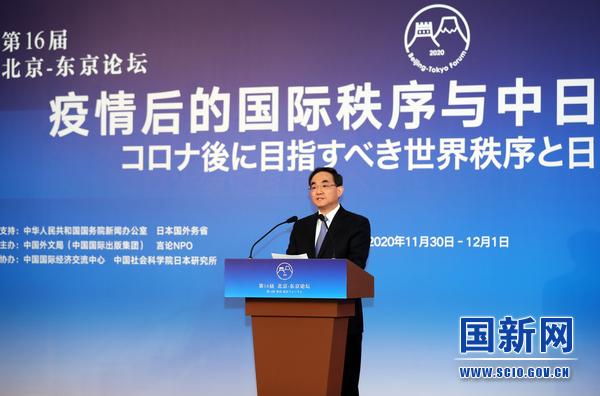


The 16th Beijing-Tokyo Forum, an annual event representing the highest public diplomatic communication platform between China and Japan, opened this Monday.

Co-hosted by China International Publishing Group (CIPG) and Japanese non-profit think tank The Genron NPO, this year's forum focused on the roles of China and Japan in the post-COVID-19 international order.
During the two-day event, guests from political, business, academic, public health and media circles of the two countries discussed a range of issues both in-person and online. Topics included bilateral relations, epidemic prevention and control and economic recovery, economic and trade cooperation, digital science and technology, and regional peace and security.
State Councilor and Foreign Minister Wang Yi addressed the opening ceremony via video link, stating that his recent visit to Japan had been fruitful, with China and Japan reaching important consensuses. He then recalled the reciprocal donations of anti-epidemic supplies when the countries were hit by COVID-19, which reflected the long-standing friendship between the two peoples.
Wang also underscored the role the media should play in presenting a true China to Japan as well as showing goodwill and inclusiveness between the people of both countries, so as to boost mutual understanding and trust.
Xu Lin, deputy head of the Publicity Department of the CPC Central Committee and minister of the State Council Information Office (SCIO), and Yasuo Fukuda, former Japanese prime minister, delivered the keynote speeches.
Du Zhanyuan, CIPG president; Yasushi Akashi, former United Nations under-secretary-general; Toshimitsu Motegi, Japanese foreign minister; and Toshihiro Nikai, secretary general of Japan's Liberal Democratic Party (LDP), also spoke at the opening ceremony.
In his speech, Xu Lin said the successful convening of the forum demonstrated the sincere wish of both China and Japan to increase communication and enhance mutual understanding.
Xu emphasized that the countries should uphold the principles of mutual respect and seeking common ground while reserving differences, and assume due responsibilities to keep bilateral ties on the right track.
In order for Sino-Japanese relations to meet the requirements of the new era, Xu suggested the two sides strengthen mutual political trust, anti-epidemic cooperation, economic collaboration, and people-to-people exchanges, and jointly contribute to building an open world economy.
During his video message, former Japanese Prime Minister Yasuo Fukuda stressed that the 16th edition of the forum should further examine what Japan and China can do for the world. He called on the two countries to contribute their wisdom to world peace amid the uncertainties brought by the pandemic.
Fukuda also suggested the two countries further enhance people-to-people and cultural exchanges so as to deepen mutual understanding between the two peoples and advance bilateral relations.
CIPG president Du Zhanyuan hailed the newly signed Regional Comprehensive Economic Partnership as an important tool for deepening economic and trade cooperation, and jointly safeguarding multilateralism and free trade.
He explained that China with its increasing opening-up and economic resilience and Japan as the world's third largest economy have the capacity to help each other and the whole of Asia.
Former under-secretary-general of the United Nations Yasushi Akashi expressed his appreciation via video message regarding China's success in controlling the epidemic, and his hope to learn relevant and valuable lessons from China through the forum.
When speaking of major-country relationships, Akashi said that Japan should not choose sides, but instead promote a new international order based on international coordination. He urged the forum's participants to conduct sincere dialogue to help build a peaceful and stable Asia and world at large.
A panel discussion chaired by Zhao Qizheng, former minister of the SCIO, was held following the opening ceremony focusing around the forum's main theme. It was attended by Cheng Yonghua, former Chinese ambassador to Japan; Yao Jingyuan, a research fellow at the Counsellors' Office of the State Council; Fumio Kishida, former Japanese foreign minister; and Rintaro Tamaki, former deputy secretary-general of the Organization for Economic Co-operation and Development (OECD), among others.
Starting in 2005, the annual Beijing-Tokyo Forum has been held alternately between the two capitals, with the aim of improving bilateral relations and deepening Sino-Japanese understanding.
This year's forum was originally scheduled to be held in Tokyo, but was held simultaneously at venues in Beijing and Tokyo due to the pandemic control requirements.
